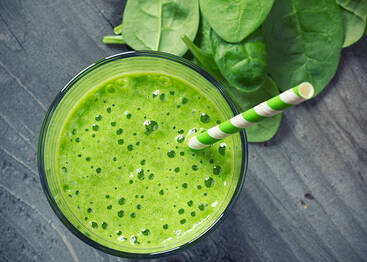 Menopause is a natural transition that marks the end of a woman's reproductive years. Duringthis time, the body undergoes significant hormonal changes that can lead to a range ofsymptoms, such as hot flashes, night sweats, mood swings, and weight gain. While there is no one-size-fits-all approach to managing menopause symptoms, making certain dietary changes can help alleviate discomfort and support overall health. In thiw blog post, we'll explore the bestand worst foods for menopause symptoms. Best Foods for Menopause Symptoms: 1. Whole GrainsWhole grains are rich in fiber, B vitamins, and minerals that can help regulate blood sugar levelsand support overall health. Opt for whole grain bread, pasta, and cereals instead of refined carbohydrates. 2. Leafy GreensLeafy greens such as spinach, kale, and collard greens are packed with nutrients that can helpsupport hormone balance and bone health. They are also rich in antioxidants that can helpreduce inflammation and oxidative stress. As with any new supplement or natural remedy, it's important to consult with your healthcareprovider before starting to ensure safety and proper dosage. 3. Fatty Fish. such as salmon, sardines, and mackerel are rich in omega-3 fatty acids, which havebeen shown to help reduceinflammation and alleviate menopause symptoms such as hotflashes and mood swings. 4. Legumes such as lentils, chickpeas, and beans are rich in fiber, protein, and phytoestrogens,which can help balance hormone levels and reduce menopause symptoms. 5. Berries such as blueberries, raspberries, and strawberries are rich in antioxidants that can helpreduce inflammation and support overall health. They are also low in calories and high in fiber,making them a great snack option. Worst Foods for Menopause Symptoms: 1. Processed FoodsProcessed foods such as chips, crackers, and baked goods are often high in refinedcarbohydrates, unhealthy fats, and added sugars, which can contribute to inflammation andweight gain. 2. Spicy Foods can trigger hot flashes and night sweats in some women. If you find that spicy foods exacerbate your symptoms, it may be best to avoid them or consume them in moderation. 3. CaffeineCaffeine can interfere with sleep and exacerbate menopause symptoms such as hot flashesand anxiety. Limit your intake of coffee, tea, and other caffeinated beverages, especially in theafternoon and evening. 4. Alcohol can worsen menopause symptoms such as hot flashes and night sweats, and can also interfere with sleep. If you choose to drink alcohol, do so in moderation and avoid consuming it close to bedtime. 5. High-Sugar Foods such as candy, soda, and baked goods can contribute to weight gain and insulin resistance, which can exacerbate menopause symptoms. Limit your intake of added sugars and opt for natural sweeteners such as fresh fruit instead. Remember, every woman's experience with menopause is unique, and what works for one person may not work for another. It's important to listen to your body and make dietary changes that support your individual needs and preferences. Here's to your health! Theresa
0 Comments
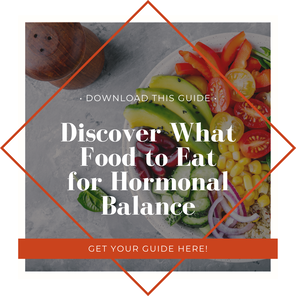 Hormonal imbalances can lead to a wide range of symptoms in women, such as irregularperiods, weight gain, mood swings, and fertility issues. Understanding the potential causes of hormonal imbalances is crucial for maintaining optimal health and well-being. In this blog post,we'll explore ten common causes of hormonal imbalance in women. 1. Stress: Chronic stress can disrupt the delicate balance of hormones in the body, particularly cortisol and adrenaline. When the body is under constant stress, it can lead to adrenal fatigue, which canaffect the production of other hormones such as estrogen, progesterone, and thyroid hormones. 2. Poor Diet: A diet high in processed foods, refined sugars, and unhealthy fats can contribute to hormonalimbalances. These foods can cause inflammation in the body and disrupt the production andmetabolismof hormones. On the other hand, a diet rich in whole foods, healthy fats, and fibercan support hormone balance. 3. Lack of Sleep: Sleep is crucial for hormone regulation. Lack of sleep or poor sleep quality can disrupt the production of melatonin, a hormone that regulates sleep-wake cycles, and cortisol, a hormonethat regulates stress response. This can lead to a cascade of hormonal imbalances throughoutthe body. 4. Exposure to Endocrine Disruptors: Endocrine disruptors are chemicals that can interfere with the body's hormone production andfunction. These chemicals can be found in plastics, pesticides, cosmetics, and household cleaning products. Exposure to endocrine disruptors can lead to hormonal imbalances and associated health problems. 5. Medications: Certain medications, such as birth control pills and hormone replacement therapy, can disruptthe natural balance of hormones in the body. Other medications, such as steroids andantibiotics, can also interfere with hormone production and metabolism. 6. Nutrient Deficiencies: Deficiencies in certain nutrients, such as vitamin D, magnesium, and omega-3 fatty acids, cancontribute to hormonal imbalances. These nutrients play crucial roles in hormone productionand regulation, and deficiencies can lead to a wide range of symptoms. 7. Menopause: Menopause is a natural transition that occurs when a woman's menstrual cycles come to anend. During this time, the body's production of estrogen and progesteronedeclines, which canlead to symptoms such as hot flashes, night sweats, and mood changes. 8. Polycystic Ovary Syndrome (PCOS): PCOS is a common hormonal disorder that affects women of reproductive age. It ischaracterized by high levels of androgens (malehormones) and insulin resistance, which canlead to irregular periods, acne, and fertility issues. 9. Thyroid Disorders; The thyroid gland produces hormones that regulate metabolism, energy production, and bodytemperature. Disorders of the thyroid gland,such as hypothyroidism and hyperthyroidism, canlead to hormonal imbalances and associated symptoms. 10. Pregnancy and Postpartum; Pregnancy and the postpartum period can cause significant changes in hormone levels,particularly estrogen and progesterone.These changes can lead to symptoms such as moodswings, fatigue, and hair loss. If you're experiencing symptoms of hormonal imbalance, it's important to work with a qualifiedholistic health practitioner to identify the underlying causes and develop a personalizedtreatment plan. This may include lifestyle changes, such as stress management and dietary modifications, as well as targeted supplements and medications. If you're interested in learning more about how to support healthy hormone balance throughdiet, lifestyle, and natural remedies, I invite you to book a free discovery session with me. As a certified health coach specializing in women's health, I can help you identify the root causes ofyour hormonal imbalances and create a personalized plan tosupport your overall health andwell-being. During our session, we'll discuss your health history, current symptoms, and goals,and I'll provide you with actionable steps to start balancing your hormones naturally. To Your Health Theresa 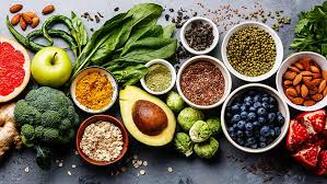 Inflammation is a normal immune response that helps protect the body against injury and infection. However, when inflammation is chronic or excessive, it can have detrimental effects on your health. Here's an overview of what can happen when the body experiences prolonged inflammation: Symptoms of Excessive Inflammation
Dangers of Unchecked Inflammation Chronic inflammation is now believed to be the root cause behind most modern diseases. Here are some dangers of unchecked inflammation:
As you can see, excessive inflammation can have far-reaching consequences for nearly every aspect of your health. The good news is many lifestyle changes and natural therapies can help put the brakes on runaway inflammation in the body. If you're interested in reaching your health goals, click here for a FREE 20-Minute Health Discovery Session. I'll provide you with a personalized approach to taming inflammation and optimizing well-being with holistic nutrition, stress management, and mind-body practices. Let's talk soon! t’s sot’s so much more than calories
It’s so much more than calories. Did you realize that much or what is causing people, to be overweight and unhealthy are the ingredients in the foods you are enjoying, and that there may be a healthier alternative that doesn’t make you feel deprived. It’s the preservatives and pesticides that are causing disruption in our health. Reading ingredients is so important. Did you know that there is sugar in bread, high fructose corn syrup in sausages. Things that you would think are healthy and innocent are not. There have been times when I just assume that a thing was ok, and eaten it, then decided to read the ingredients after the fact, and can’t believe what I’m reading. It’s not that you can’t enjoy the foods you like, there is usually a healthier alternative that tastes just as good, but you just need to be aware. “So what am I looking for”, you ask? “I don’t read the ingredients because I don’t even know what I’m looking for”, you say. Well I’m sure you have heard this before, but it’s true. If you can’t pronounce it, it’s most likely something you shouldn’t be eating. That is why we say, if you walk the perimeter of the store, these are the things that are best. Our bodies are meant to process Whole Foods, not chemicals or pesticides, preservatives, or 3000 things that are trying to disguise sugar. All these unnatural substances are doing damage to our bodies and our health. They affect our endocrine system and our hormones . We have more hormones than the ones that enter our minds when we hear the word, hormones. When hearing that it disrupts our hormones, we probably think of estrogen, progesterone, testosterone. And disrupting these hormones is not good for our bodies and our energy, amongst other things, like causing chronic illness. But there are a whole other slew of hormones that also are important. First, what is a hormone? It’s a chemical messenger in our body, and they do a lot of different things. Some other hormones are cortisol: our stress hormone, insulin, which regulates sugar, adresnalin, which gives us energy in a crisis, Thyroid stimulating hormone, or TSH, which is Important for….. you guessed it, proper thyroid function. So not eating things that affect our endocrine system, and our hormones IS IMPORTANT. Reading and understanding ingredients is IMPORTANT! For all bodily functions, including weight-loss, or weight/gain, illness, anxiety, depression and many more. These ingredients that affect our hormones also affect our health in so many ways. Our hormones are like an orchestra and one instrument out of whack can affect everything. So please read your ingredients. It’s not all about just calories in, calories out. There are many thing’s involved. For example stress…….. but that is another topic for another day. For more help on ingredients and what to look for check out my Understanding ingredients private class here. To your health. Theresa healthy are the ingredients in the foods you are enjoying, at’s so much more than calories Did you realize that many of the thing’s causing people, to be overweight and unhealthy are the ingredients in the foods you are enjoying, and that there may be a healthier alternative that doesn’t make you feel deprived. it’s the preservatives and pesticides that are causing disruption in our health. Reading ingredients is so important. Did you know that there is sugar in bread, high fructose corn syrup in sausages. Things that you would think are healthy and innocent are not. There have been times when i just assume that a thing was ok, and eat it, then decide to read the ingredients after the fact, and can’t believe what I’m reading. It’s not that you can’t enjoy the foods you like, there is usually a healthier alternative that tastes just as good, but you just need to be aware. “So what am I looking for”, you ask? “I don’t read the ingredients because I don’t even know what I’m looking for”, you say. Well I’m sure you have heard this before, but it’s true. If you can’t pronounce it, it’s most likely something you shouldn’t be eating. That is why we say, if you walk the perimeter of the store, these are the things that are best. Our bodies are meant to process Whole Foods, not chemicals or pesticides, preservatives, or 3000 things that are trying to disguise sugar. All these unnatural substances are doing damage to our bodies and our health. They affect our endocrine system and our hormones . We have more hormones than the ones that enter our minds when we hear the word, hormones. When hearing that it disrupts our hormones, we probably think of estrogen, progesterone, testosterone. And disrupting these hormones is not good for our bodies and our energy, amongst other things, like causing chronic illness. But there are a whole other slew of hormones that also are important. First, what is a hormone? It’s a chemical messenger in our body, and they do a lot of different things. Some other hormones are cortisol: our stress hormone, insulin, which regulates sugar, adresnalin, which gives us energy in a crisis, Thyroid stimulating hormone, or TSH, which is I’mportant for….. you guessed it, proper thyroid function. So not eating things that affect our endocrine system, and our hormones IS IMPORTANT. Reading and understanding ingredients is IMPORTANT! For all bodily functions, including weight-loss, or weight/gain, illness, anxiety, depression and many more. These ingredients that affect our hormones also affect our health in so many ways. Our hormones are like an orchestra and one instrument out of whack can affect everything. So please read your ingredients. It’s not all about just calories in, calories out. There are many thing’s involved. For example stress…….. but that is another topic for another day.nd that there may be a healthier alternative that doesn’t make you feel deprived. it’s the preservatives and pesticides that are causing disruption in our health. Reading ingredients is so important. Did you know that there is sugar in bread, high fructose corn syrup in sausages. Things that you would think are healthy and innocent are not. There have been times when i just assume that a thing was ok, and eat it, then decide to read the ingredients after the fact, and can’t believe what I’m reading. It’s not that you can’t enjoy the foods you like, there is usually a healthier alternative that tastes just as good, but you just need to be aware. “So what am I looking for”, you ask? “I don’t read the ingredients because I don’t even know what I’m looking for”, you say. Well I’m sure you have heard this before, but it’s true. If you can’t pronounce it, it’s most likely something you shouldn’t be eating. That is why we say, if you walk the perimeter of the store, these are the things that are best. Our bodies are meant to process Whole Foods, not chemicals or pesticides, preservatives, or 3000 things that are trying to disguise sugar. All these unnatural substances are doing damage to our bodies and our health. They affect our endocrine system and our hormones . We have more hormones than the ones that enter our minds when we hear the word, hormones. When hearing that it disrupts our hormones, we probably think of estrogen, progesterone, testosterone. And disrupting these hormones is not good for our bodies and our energy, amongst other things, like causing chronic illness. But there are a whole other slew of hormones that also are important. First, what is a hormone? It’s a chemical messenger in our body, and they do a lot of different things. Some other hormones are cortisol: our stress hormone, insulin, which regulates sugar, adresnalin, which gives us energy in a crisis, Thyroid stimulating hormone, or TSH, which is I’mportant for….. you guessed it, proper thyroid function. So not eating things that affect our endocrine system, and our hormones IS IMPORTANT. Reading and understanding ingredients is IMPORTANT! For all bodily functions, including weight-loss, or weight/gain, illness, anxiety, depression and many more. These ingredients that affect our hormones also affect our health in so many ways. Our hormones are like an orchestra and one instrument out of whack can affect everything. So please read your ingredients. It’s not all about just calories in, calories out. There are many thing’s involved. For example stress…….. but that is another topic for another day. much more than calories Did you realize that many of the thing’s causing people, to be overweight and unhealthy are the ingredients in the foods you are enjoying, and that there may be a healthier alternative that doesn’t make you feel deprived. it’s the preservatives and pesticides that are causing disruption in our health. Reading ingredients is so important. Did you know that there is sugar in bread, high fructose corn syrup in sausages. Things that you would think are healthy and innocent are not. There have been times when i just assume that a thing was ok, and eat it, then decide to read the ingredients after the fact, and can’t believe what I’m reading. It’s not that you can’t enjoy the foods you like, there is usually a healthier alternative that tastes just as good, but you just need to be aware. “So what am I looking for”, you ask? “I don’t read the ingredients because I don’t even know what I’m looking for”, you say. Well I’m sure you have heard this before, but it’s true. If you can’t pronounce it, it’s most likely something you shouldn’t be eating. That is why we say, if you walk the perimeter of the store, these are the things that are best. Our bodies are meant to process Whole Foods, not chemicals or pesticides, preservatives, or 3000 things that are trying to disguise sugar. All these unnatural substances are doing damage to our bodies and our health. They affect our endocrine system and our hormones . We have more hormones than the ones that enter our minds when we hear the word, hormones. When hearing that it disrupts our hormones, we probably think of estrogen, progesterone, testosterone. And disrupting these hormones is not good for our bodies and our energy, amongst other things, like causing chronic illness. But there are a whole other slew of hormones that also are important. First, what is a hormone? It’s a chemical messenger in our body, and they do a lot of different things. Some other hormones are cortisol: our stress hormone, insulin, which regulates sugar, adresnalin, which gives us energy in a crisis, Thyroid stimulating hormone, or TSH, which is I’mportant for….. you guessed it, proper thyroid function. So not eating things that affect our endocrine system, and our hormones IS IMPORTANT. Reading and understanding ingredients is IMPORTANT! For all bodily functions, including weight-loss, or weight/gain, illness, anxiety, depression and many more. These ingredients that affect our hormones also affect our health in so many ways. Our hormones are like an orchestra and one instrument out of whack can affect everything. So please read your ingredients. It’s not all about just calories in, calories out. There are many thing’s involved. For example stress…….. but that is another topic for another day. 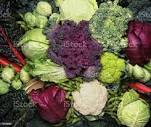 So my previous blog posts were intended to document my journey on a 21 day hormone detox. Now I am a health coach, and I have a program to help women feel better during perimenopause. This was just a little more regimented, and I thought I would try it and document it. Typically I eat pretty healthy, I know not to eat premade foods with lots of preservatives, and other ingredients that are not easy to pronounce. Eat organic, don't heat things in plastic containers, etc. I help people understand ingredients and help them lose weight, calm down hot flashes, have more energy, less pain, and help with health recipes. But I have my ways and certain things that I am used to cooking. So this was a bit of a challenge. I did this in November, from 1-21, figuring it would be easier to stick to when there was a holiday at the end of the road. But I wanted to document it first, and then write about it. Anyway, my writing about it, got a little off track, as I didn't keep up daily, and then the holidays happened. Now here it is January, and I'm past it, so I figured in order to move forward, I would juat put the rest of the days, 6-21 in one blog. So, this is it, then onward to 2024! Monday, Nov 6, For breakfast, the grain free cereal, which I really like: Recipe: 1 Tbsp. ground flaxseeds 1 Tbsp. pumpkin seeds 2 Tbsp. shredded coconut 2 tsp. chia seeds ¼ tsp. cinnamon Pinch sea salt 1 vanilla bean, seeded (optional) or dash of vanilla extract hot water 7 drops liquid vanilla cream or plain stevia or ½–1 tsp. sweetener of choice 4–5 strawberries or other seasonal fresh fruit 1 Tbsp. goji berries coconut milk Grind flaxseeds into a fine meal and set aside (Note: you may grind a cup of flaxseeds ahead of time and store in an airtight glass container in the refrigerator for future use.) Using a hand blender like the Magic Bullet, a Vitamix dry blade, or a food processor, process pumpkin seeds, coconut, chia, cinnamon, sea salt, and vanilla until finely ground. Add ingredients to a serving bowl and mix in ground flax seeds. Add hot water to cover. Add stevia or sweetener of choice. Mix well. Top with fresh fruit, goji berries, and a drizzle of coconu Tues, 7 Breakfast, Grain freee cereal, above. I did not eat lunch which is not great because it causes stress, which we are trying to limit, but I did not have time, nor could I find a good salad. I combined both the soups for dinner and made some brussel sprouts and kale for the side Wed Nov 8, For breakfast, Grain free cereal, Apparently I really like this. I put frozen berries on top. You may be getting bored, there are a few more recipes to choose from, but, knowing how to do one or more things and just doing them over so it is easy, especially with breakfast when trying to leave the house, just seems so much easier. An apple for lunch, its all I had with me I was going to make this super easy morrocon chicken for dinner, but I went to the store for the ingredients and forgot the chix stock and tomatoes, so finishing up the rest of both soups, with some veggies on the side. I felt more full adding some veggies, so that was a good idea. Thurs, Nov 9 I had grain free cereal for breakfast. Again, I forgot lunch, so I bought a Kind bar and had it with water. Almonds and cranberries. Although, it was a little too much sugar for being on the detox, but the almonds and cranberries were about the best I was going to be able to do to hold me til dinner. So, I would definitely not recommend this bar if trying to lose weight, and this is an example of a reason why some people have a hard time losing weight. You would think that I kind bar is healthy, and it does have some healthy things, and yes, it can hold you over, but it still has too many ingredients that are not good for helping with weightloss. If you are not looking for these things, or just trusting advertising, this is one place where people go wrong. For dinner, morrocan chicken. It is pretty simple to make. I was going to make the hash, but a little too entailed while making the chicken at the same time. So I made sweet pot fries, which were just sliced sweet potatoes, chipoltle spice, cinnamon and cumin. They were amazing. Morrocan Chicken Recipe: 1 Tbsp. ghee ½ cup shallots sliced 1 Tbsp. fresh ginger, peeled and chopped 1 tsp. turmeric 1 tsp. cinnamon 2 tsp. paprika ½ tsp. coriander ½ tsp. cumin 1 tsp. sea salt 2 cups tomatoes, chopped 2 cups chicken stock 1 lemon sliced, rind on, deseeded ½ cup chopped cilantro 6 boneless skinless chicken thighs ½ bunch green kale, chard, or spinach, chopped ½ lemon, juiced Heat a large sauté pan or pot on medium heat. Add ghee and sauté shallot and ginger until soft. Add turmeric, cinnamon, paprika, coriander, cumin, and sea salt and sauté one more minute. Add tomatoes, chicken stock, sliced lemons, and cilantro and simmer for 10 minutes. Add chicken thighs, cover, and simmer for 30 minutes. Add chopped greens and lemon juice. Cover again and simmer 5–10 more minutes. Remove from heat, and add salt and pepper to taste. I had water to drink with a splash of cranberry juice. For me, still healthier than wine, and while only a splash for a little flavor, it is pretty much water. So far, Friday I have lost 3 lbs. Which for me, that is a decednt amount. Cutting out wine, and pumplin ice coffees are helping a lot, I know. It seems like just a dring here and there, but I know the sugar and other chemicals really mess with you. And knowing I am stcking to this is really helping keep me on track Friday, for breakfast I made the Apple/Carrot smoothie. I used organic fuji apples. When I ate one of these apples, they were amazing, so not sure if that is what made the smoothie so great, but this smoothie was amazing. Also, it calls for brewed green tea. I feel like the warmness that the tea brought to the smoothie also made I treallly great. Fat Flush Smoothie, 1 handful parsley or cilantro 4 small apples, cored 2 carrots, peeled 1 Tbspn. ground flaxmeal ½ lemon, peeled ½ tspn. lemon zest ¼” ginger, peeled 3 cups brewed green or rooibos tea I had a salaed for lunch, and being Friday, I had to break down. I had Tuna pizza for dinner, with a glass of wine. Know let me tell you, that we have a pizza place here that is owned, run by a true Italian who gets his ingredients from Italy. So, I feel that his flour and crust, is a little better as far as toxins and pesticides go. And I had Scout and Cellar clean crafted wine. So although I cheated, I feel like my ingredients were quality. Saturday, Nov 11, I had the rest of my apple carrot smoothie for breakfast. It was amazing. For lunch, a salad, and I did end up going out to eat for dinner. I had Fish tacos, and French fries I have to admit. 21 days of a detox isn’t easy with other people eating normal, and wanting to go out,so I just try to do the best I can. Saving things for the weekend, but still trying. Sunday, Nov 12, back on track. For Breakfast, I ended up making the Adzuki Hash. It makes more than one meal, so I ended up also using it as a side a few nights. 2 Tbsp. extra virgin olive oil 1 medium onion, diced 2 medium sweet potatoes or 2 parsnips, peeled and diced small 2 tsps. dried thyme ½–1 tsp. ground cumin 2 cups cooked adzuki beans (you can cook in advance using instructions below or buy Eden Organics canned adzuki beans) 4 to 5 collard greens, finely chopped* sea salt and black pepper to taste Heat a large skillet over medium heat. Add olive oil, onions and a few dashes of salt. Saute for a few minutes. Then add yams or parsnips, thyme, and cumin. Saute for a few minutes uncovered then cover your pan and cook for about 15 to 20 minutes, stirring occasionally, until yams are tender. Watch carefully so they don’t burn. Add cooked adzuki beans and collard greens. Saute a few minutes more, or until collards are tender. Add sea salt and pepper to taste. Adzuki bean cooking instructions: Soak beans a minimum of four hours and up to overnight to reduce cooking time and ease digestibility. Drain and wash soaked beans. Place soaked beans in a pot with water (one cup beans to three cups water). Add kombu seaweed to cooking liquid to increase nutrient absorption and again, digestibility. Cook for 1 to 1½ hours. Yields 2 cups beans. Sunday night, Morrocan chicken, which was also really great. This was 2 meals for me. Monday, Nov 13, For Breakfast, Squash pudding. Noticing that more than one dish called for baked squash, I baked a bunch of squash on Sunday.to make the cooking seem less overwhelming, a Panera fuji apple chicken salad for lunch and more morrocan chicken for dinner. Squash Pudding, I thought this was really great! INGREDIENTS : ½ cup baked acorn or butternut squash ¼ cup coconut milk or nut or seed milk, plus more to blend 1 Tbsp. ground flaxseeds ½ tsp. cinnamon Pinch sea salt 8–10 drops liquid stevia 1 tsp. coconut oil Combine in blender until smooth. Tuesday, I did forget breakfast, which I would not recommend. I made the Cream of Broccoli soup for dinner. I also added boneless skinless organic chicken thighs as Soup is usually not enough for me. Wednesday Nov 14, I had grain free ceraal for breakfast, and a salad for lunch. With the rest of the Cream of broccoli soup for dinner, and also added chicken and sweet potatoes, sliced with cinnamon, chipoltle seasoning and sea salt. This is all I recorded, and at this late date, I cannot remember if I made it the full 21 days, but I not think that I did. I feel like 14 was a good try, and I did lose 5 lbs. Like I said before, I always read my ingredients, do not eat fast food, or drink soda, so my eating is fairly healthy. But here, making the specific meals, and making acutal breakfasts and no wine, are what made it more difficult. What I am hoping you can take away from this, is that detoxing doesn't necessarily mean green juice and No food. There are foods that actually help our body detox. Eating whole foods, without pesticides, and preservatives, adding spices, drinking a lot of water, are some of the things that can help our bodies cleanse themselves. Detoxing is about clearing out the toxins, and to do that we need to clear the detox pathways, so that the toxins can find their way out. If we detox too quickly, or too much, and the pathways aren't clear, we end up having the toxins from our cells just cirulating in our blood and that is not a good thing. Also, although I am a health coach, one reason that I did this and posted it here is to show you that just because I know what to do, I also realize it isn't easy. Health Coaches are human too, and we realize what our clients go through in trying to eat healthy. And if you make a mistake, it's ok, do not beat yourself up. The problem with a slip is it discourages us, and then can have the tendency to make us quit all together. But that doesn't need to happen, a slip is just a slip, just keep going. Sorry if this is the most boring blog I have ever written......lol  Day 5 Sunday, I at the egg free Omlet for breakfast. I put fruit in this, instead of mushrooms, peppers, and whatever your normal omlet filling is. It says in the recipe the consistency of crepe batter, and that had me thinking fruit. Eggless Omelette with Garbanzo Bean Flour INGREDIENTS ½ cup garbanzo bean flour approximately ½ to ²⁄³ cup water good size pinch sea salt pinch black pepper 1 tsp. ghee or coconut oil your favorite filling (see below for some ideas) Place Ghee or coconut oil in a pan over medium-low heat. Meanwhile, scoop the ½ cup garbanzo bean flour in a two-cup measuring cup or into a Magic Bullet. Add water to the measuring cup or mini blender and stir with a fork or blend until well blended. The mixture should be the consistency of slightly thick crepe batter. Add salt and pepper and beat or mix again. Pour batter into heated pan with ghee or coconut oil. Cover the pan with a lid and allow to cook over medium-low heat for five to eight minutes. Check after five minutes to ensure that you are cooking the batter to your desired doneness. I like it on the softer side but want it cooked enough that I can easily “flip” it, fold it and remove it from the pan. After this time, you can load half of the circular shape with your desired omelette filling. Flip over the uncovered half. And cover the pan for a minute or two more. Cooking to desired crispness. Wala! Remove from pan and you’re ready to eat. smoked salmon sauteed spinach sauteed mushrooms roasted red peppers cooked onions avocado asparagus tomatoes cooked apples or pears pesto roast veggies or wrap this baby around your favorite turkey sausage and eat with a side of kraut the possibilities are simple and endless . . . I made the chicken soup for dinner......Recipe here remember, some of the key things to detox, are not only what you eat. Detoxing, especially when it comes to helping your hormones has to do with giving your body a rest by also lessening the toxins you take in, that means toxins from plastics, to go coffee covers, water bottles. And after the detox, if you happen to go back to eating foods in a box, take care not to microwave that plastic container, where heating the plastic is a sure way to have micro toxins leak into your food. You may not think these things are a big deal, but they are the biggest deal, working your way into your food and disrupting your endocrin system, which pretty much regulates all of your hormones. And keep drinking that water to flush out those toxins, keeping your cells hydrated helping your skin to look better too! Here's to your Health Theresa 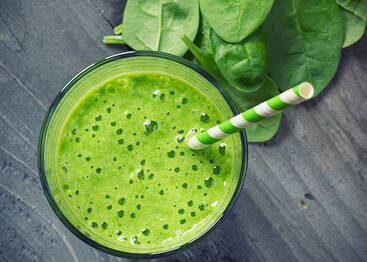 I have been trying to post each day, and although written and documented each day when I did this, I have fallen behind a bit in posting it. So, on this day, Day 4, Saturday Nov 4, I made this smoothie for breakfast. Chia Green Smoothie 2 pears or 2 cups raspberries 2 cups coconut water 1 Tbsp. chia seeds ½ vanilla bean, seeded or dash of vanilla extract 1 Tbsp. hemp protein powder or hemp seeds Handful of greens such as kale, spinach, or Romaine lettuce Pinch sea salt 1 Medjool date, pitted (optional) or a few drops of stevia Each ingredient in these recipes are carefully chosen to help balance your hormones. Another important part of the daily routine in this detox, or in everyday life is making sure we get enough water. Aim for half your body weight, converted into ounces, as a general rule. WHY DRINK WATER? Water is crucial for diluting and eliminating toxic accumulations. Water is our most important detoxifier. It helps us clean through our skin and kidneys, and improves our ability to sweat during exercise. We need 48 to 64 ounces daily to replenish the water lost through urination, sweat, and breathing. Two glasses of water thirty to sixty minutes before each meal will help to flush toxins. WATER INFO TO CONSIDER
WATER’S VITAL FUNCTIONS dissolves nutrients so that they are more easily absorbed in digestive tract transports chemicals and nutrients to cells and tissues carries waste materials from cells to kidneys for filtration and elimination absorbs and transports heat WATER BUDGET Drink 8 to 12 glasses (8 ounces each) of water a day! Caffeine and alcohol draw water out of your cells. If you consume these beverages, compensate by drinking an additional glass of water. Plan on drinking 8 ounces of water every two hours you are awake. Start your day with at least 2 eight ounce glasses of water before any food intake. Try the above before each meal This day, I was invited to my son’s for lunch. Being 24, and his fiance’s aunt’s birthday I had no control over what was made, and I wanted to be social, so I ate what was made, nachos, queso,and mac and cheese, choc cake, which was amazing. I knew I would get back on track by dinner, so I ate it….lol Dinner was the chicken soup using this recipe: INGREDIENTS : 1 whole chicken (ask them to cut into pieces at the store, if you prefer) 4 large carrots sliced ½ bunch kale chopped 2 onions choppe 3 celery ribs sliced 3 clotves of garlic chopped 1 Tbsp. salt 1 tsp. onion powder 1 tsp. garlic powder 1 1½ tspns. 1 tsp celery salt Directions: Wash chicken and place in a pot. Cover with cold water (by about one inch) and boil for 3–5 minutes or until the water gets foamy. Skim off the foam. Add carrots, kale, onions, celery ribs with leaves, garlic, salt, and all seasonings. Simmer for 2 to 3 hours or until the chicken meat starts to fall off of the bone. Remove meat from soup and let cool. Strip the chicken off the bones and return the meat to the soup. This makes a very large batch and some can be frozen for later. 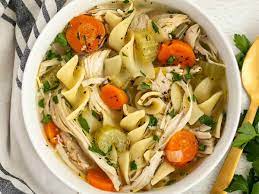 Here's to your health. Theresa Day 3, I am starting out well with the grain free cereal for breakfast, which I actually love. Messed up a little, forgot the coconut milk, making it a little dry, but still really good.
Tonight I am determined to get the correct ingredients for the dinners. Also playing a factor, is I lost my debit card on Saturday Ok, so another fugi apple salad for lunch. One thing that I know is that not eating because you don’t have the exact right food with you because you are on the road, and didn’t think of it in the morning. Is that starving yourself actually just creates stress in your body, which effects your hormones and that is one thing we are trying to avoid. Ok, so Tues, wed, thurs without wine. So, it’s Friday. Typically pizza night. What should I do. Truthfully, except for breakfast, I still do not have all the ingredients. The pizza I get is from a true Italian restaurant who gets all his ingredients from Italy. Why is this better? Because they do not treat the wheat in Italy with pesticides just to knock it down, making it easier to reap. So I trust that at least It is not the worst pizza for me, except that Wheat is on my food sensitivity list. The pizza I always get is a tuna pizza with capers. So that is dinner. I sell wine, Scout and Cellar Clean Crafted wine. In Scout and Cellar, there are no added preservatives, no pesticides, and no added sugar. Making it fo me, mostly guilt free. In a typical glass of wine, there can be up to 16 tsp of sugar, making it equal to that of a donut. Not to mention the pesticides, and added preservatives, which are things we are trying to avoid in a detox. Do't get me wrong, I would not recommend doing this on a nightly basis, or having more than one glass during a detox. But I have also found an organic wine that Is sustainably farmed. Now I know that this is not as clean a wine as what I sell, but I do think if getting wine from a liquor store, it is a half way decent alternative. Anyway, I have gotten the ingredients at least for the chicken soup. which is on the menu, What I have found is that the supermarket overwhelms me. But I have now gotten the ingredients for at least the chicken soup. Other than the pizza, I have, stuck to the hormone friendly ingredients that I do have on hand, such as boneless, skinless chicken, spices such as cayenne pepper, cinnamon, cumin, organic greens, and cruciferous veggies, garlic, onions to name a few, even if I do not have the exact ingredients, But what I know is having the correct ingredients makes it easier to have something to eat on hand. Unfortunatly for me the thought of cooking on little time is hard too. But I am sticking to this even though the process and getting set up is taking longer than expected, and by the end of the 21 days, I will have developed new habits, more focus on what I am eating, new knowledge of recipes, that I can have ongoing, and hopefully developed spme new cooking and shopping skills. I am trying to show here, although it wasn't initially my intention, that if you have a goal in mind, even if you mess it up the first day, or for a few days, instead of scrapping the whole thing, you can continue towards it, and if you keep consistently trying, you will get there. And also this is making me think about the ingredients that I am eating, and finding alternatives, and substitutes. To your health, Theresa The purpose of this blog on my hormone balance detox is, to show you really what a detox can be, to show that I am human, and even though a health coach, am not perfect. Sometimes people don't want to eat with me because they feel i will judge. Believe me, I know it is not easy. And even though I do eat healthy most of the time, I do like to indulge sometimes. I just know what to do about it, and some tips that work wonders, that the average person doesn't realize. And also to show that you can find substitutions. So, onto day 2. I have my ingredients, but coffee first, even though that is not the correct way to do it. But, somehow, waking up, when it is 30degreees out, makes you or at least me want coffee firsrt thing. After walking the pups, I made the cereal, with Strawberries, It was very good. I couldn’t use the vanilla, because it is on my food sensetivies list, and I didn’t use sweetner, and I still thought it was really great. We will see how long until I am hungry. Remember, this is 21 day detoxe for hormone balance. Typically I do not believe in dieting, but eating better. So if this doesn’t keep me full, I will go to other food on the list that is ok for this detox. Not meant to be a diet, but just to get back on track for eating more healthy whole foods, create a lifestyle change, and maybe try out some new recipes that I didn’t have, so that when eating healthy, I have more go tos The cereal did definitely keep me satisfied until lunch. For Lunch, I had a fuji apple salad from Panera. I should have definitely prepared more for this. I keep thinking, I will get the food for the week, or I will have time to go shopping. But when I am shopping, I have saved so little time, that I hurry, and have a hard time focusing on getting everything. I need to work on thats, this is also helping me understand the difficulty clients have in eating as healthy as they would like. Meanwhile, I am using the rules, and doing the best I can. For a snack after work, I had a half of avocado, a very healthy fat, and source of protein, for those who didn't know. And for dinner, which I should be having the soup, or baked cod, I had chicken that I already had, and broccoli, and carrots steamed, with sea salt. I also made my own fries with a sweet potato, andsome spices, cinnamon, and chili powder and salt. Same as last night. I made fries because they cook quicker than a sweet potatoe, but I baked them with a drizzle of avocado oil. Not fried. Not a perfect day on the detox, but I think I did well, at least having the correct breakfast, and improvising for dinner. No wine. Luckily, it is easier for me to go without wine than without coffee, at least morning coffee. That being said, having a coffee in the car, is just something I love, especially in the winter. But one of the keys to balancing hormones is cutting out plastics. That is definitely a difficulty for me. As I said, I have yet to find even a ceramic mug without a lid that is plastic. On another note, there are certain spices and veggies that balance your hormones and clear your pathways, and support your systems better than others, but if you are crushed for time, and haven't planned well, at least eating whole foods, not packaged, and with clean ingredients is a start. For more tips on that, contact me here. Here's to your health!
Theresa 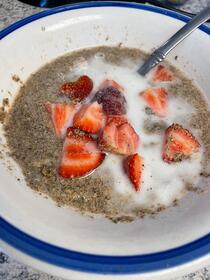 One thing to keep in mind that a few of the things that really contribute to hormone imbalance are endocrine disruptors such as plastics and certain ingredients that we put on our skin. As far as the ingredients not to put on skin, click here. Plastics, especially when heated, such as coffee cup lids, and water bottles, some of which have been around for a while and have sat in the sun before we even get them. I do not have it all together yet, so do not have all the ingredients that I need for my breakfast today. Although I used to just have coffee in the morning, a few weeksa ago with all the pumpkin rpoducts, I have slipped. So. I am determed to start today. Monday and Tuesday, I rushed around so much, I did not have time to get the ingredients Started this, Nov 1, a Wednesday). One reason why stopping and doing what you need,(self care), and being present is so important, as you have probably experienced, if not it throws everything off. And makes it hard to recover. Which is a huge part of the issue of people sticking to eating healthy in the first place. I find that when this happens, you need a strong Why. My why is health. I am getting older, and I know that part of the issue for so many things going wrong when you get older is not doing the right thing for our health. Mostly because we haven’t taken control, or because we don’t know what to do. So, even though I do not have the correct ingredients or the time, I am, just for today going back to just coffee. I started doing just coffee because, I thought and felt that with just coffee in the morning, and not eating, my blood sugar wouldn’t spike, and I would not be hungry for a longer period of time. It seemed to feel right, but…….I recently learned that having coffee on an empty stomach was just the opposite. And it caused insulin spikes, because of the caffeine, reacting from your cortisol. I did discover though, that if you do Dave Aspreys, Bullet proof coffee, or some form of adding butter, coconut oil, and or even cinnamon to your coffee you can help level off that insulin spike. I do not sell, or get anything for mentioning Bulletproof coffee.....it is just a reference. Above is a picture of the breakfast I made once I did get the ingredients. I have to say, it was really good, made of Pumpkin seeds, Chia seeds, flax, coconut, coconut milk. I am actually doing 2 thinks at once here. I recently took many tests, as part of FDN, Functioal Diagnostic Nutrition School that I am attending, and am also working on the results of those. Which soon, I will be also able to test my clients to help them even further understand what exactly is going on in their bodies. Learning that I do not have enough cortisol during the morning, which is what is probably causing me to get out slow in the morning, so I will begin to take Licorice root. Please realize that nothing I am doing is a cause for you to do it without consulting a doctor. Or testing. Also, due to not having enough cortisol, I have started taking a supplement called Adapt and Align, along with using DoTerra Copaiba, and Alignable, to keep my adrenals supported. Your adrenals carry the weight of your nervous system. When you do not produce enough cortisol to keep you going, something has to bear the brunt of your stress, So these help to not have Adrenal Fatigue. There are many reasons for not skipping lunch, you just have to make it a healthy one. One reason is that it puts stress on your body. Whether your stress is coming from inside, or outside to much does reak havoc on those hormones. Because I did not have the ingredients, as mentioned for today, specifically, I made a healthy meal, from ingredients that I know are clean: Organic, Free range skinless, boneless chicken, brocoli, brussel sprouts and Kale sauted in Avacado Oil, and sweet potatoe fries that I made myself, just by slicing a Sweet Potato, and adding cinamon, Cayenne pepper and sea salt, and avacado oil, and baking on 400 for about a half hour. Why Avacado oil? Well, Avacado and coconut oil are the best oils to use at high heat. Olive oil is very good for you, as long as it is virgin, or extra virgin, but should not be heated above a certain temp, or its good qualities turn carcinogenic. And contrary to popular belief, due to the way Canola oil is processed, it is not a good source of oil at all, unless you are using unrefined, cold pressed, organic, minimally processed. Of course all oils should be that anyway. Well, I really wanted to try going to bed at 10. That is super hard for me. Like some kind of defiant child. I started going go bed later when my kids were in highschool, and I felt I had to monitor what they were doing online. And make sure they went to bed. That got me into a pattern that I kind of like. I had always gone to bed late before I had kids. I guess I kind of think of it as a right of passage into adulthood, So, now, even though I know that going to bed at 10 is ideal for Circadian rythm, and the hours between 10-2 are like getting 2 hours sleep for one. Even though I know this to be true, I do not understand how that can be true. How does our body know what time it is. Especially if we are getting the right amount of sleep. Apparently, Circadian rythim is to blame. But I feel like I am missing something going to sleep that early, I am not tired, at leaset I don’t think so. So, like some kind of defiant child, it is very hard. I would like to try it. And thought I would compromise with 11pm last night, but no, 12 it was. I will keep trying. No wine, though, and none of that Halloween candy staring at me in the bowl that I need to figure out what to do with. Ok, so that was day 1. Not bad. To your health.... Theresa |
Archives
April 2024
Categories nutrition, healthy eating, clean eating, detox, kick the sugar, weightloss |
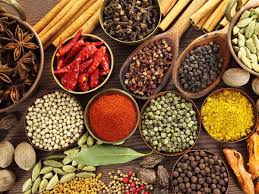

 RSS Feed
RSS Feed